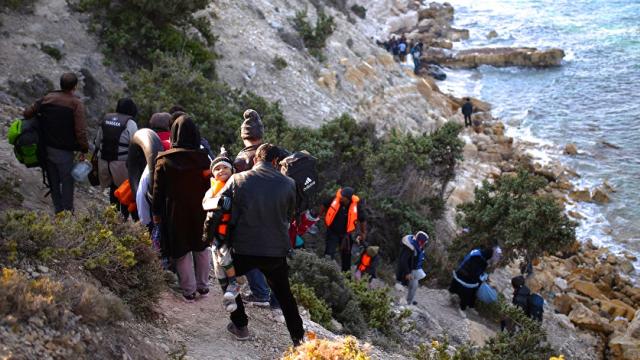
Two months after a refugee rally in London saw hundreds of thousands gather to protest the U.K. government’s treatment of refugees, fresh calls are being made urging Britain to consider taking in more Syrian immigrants.
Labour leader Jeremy Corbyn recently repeated demands that Prime Minister David Cameron stretch beyond the government’s pledge to allow the U.K. to take on up to 20,000 refugees from Syria during the next five years.
Corbyn’s renewed pleas were revealed in the wake of a controversial decision made by the local authority of the city of Portsmouth in the south of England. The Conservative-led Portsmouth Council controversially requested to be removed as a "cluster area" for families seeking asylum.
The Portsmouth City Council has defended its decision to close its door on immigrants, claiming the move spoke for the majority of people in the city. Donna Jones, leader of the Portsmouth Council, strongly supported the decision to spend city resources first and foremost looking after Portsmouth's own. She argued the city wants the U.K. government to reassess Portsmouth's status as an asylum "cluster" to “ease on school places, children’s services, social care and housing.”
The decision was met with contempt by many. Portsmouth Cathedral said it was “appalled” by Council’s judgement, particularly toward children seeking asylum, saying in a press statement: “Its rejection of asylum seekers is mean spirited and narrow minded. It is disingenuous of the council to have focused on unaccompanied asylum seeking children as the main issue – currently there are five such children in the city.”
The News, a local Portsmouth news site, noted that from April to June of this year, Portsmouth had taken just 124 asylum seekers, and that it’s the U.K. Home Office which pays for them, not the people of Portsmouth themselves. According to the site, that there are no "unaccompanied children" in the city’s schools. “To listen to [Donna Jones] you’d think our schools are over-run by unaccompanied children who can’t speak the language and are stealing the places of the far worthier children of Portsmouth,” wrote the News.
Refugee Support Also Grows
At the same time, many people from Portsmouth don’t want to close the door to asylum seekers. Scores of activists recently gathered in the city voicing their opposition to the decision to remove Portsmouth as a cluster area taking refugees.
Carys Morgan, a student at Portsmouth University who was among the protesters, said that “the council is not actually representing what the people of Portsmouth want.”
The clash between a local authority that doesn’t want to take in refugees, and the citizens who do, as well as the divided response among politicians and leaders is representative of the wider, complex issue of aiding and taking in refugees in the U.K. and across Europe.
David Cameron, whose pledge to allow up to 20,000 Syrians into Britain during the next five years has been scorned by many as a pitifully small amount, admitted that the ongoing refugee crisis has presented a “difficult challenge” to persuade Britons about the benefits of E.U. membership when “thousands of Syrians were coming to our shores.”
Cameron has promised Britain a referendum on whether or not the U.K. should stay in the European Union by 2017. The Prime Minister wants the country to stay in Europe, but under renegotiated terms.
U.K. Immigrant Clampdown
In a speech in May, Cameron set out plans to “significantly reduce” the amount of skilled workers coming into Britain from outside Europe. Cameron’s announced immigration clampdown coincided with data released by the Office of National Statistics that showed net annual migration to Britain had risen by 52% between 2013 and 2014.
The Prime Minister admitted the lack of progress in clamping down on immigration was “disappointing," and leading Tory Eurosceptic Peter Bone recently speculated that the refugee crisis in Europe may cause the E.U. to change its rules regarding immigration so that it is more in line with U.K. objectives.
“David Cameron has always said he understood the issue of immigration and migration and the need to end free movement,” said Bone. “I would have thought that with the turmoil in the E.U. it is more likely the E.U. will want to change free movement – which might support his case rather than make it more difficult.”
By contrast, the opposition's party leader, Corbyn, is a supporter of the free movement of people in Europe. Being unashamedly pro-immigration and pro-welfare, Corbyn has strongly urged the U.K. to play a more active role in the refugee crisis in Europe.
Europe Not Doing Enough
This year, approximately half a million migrants, mostly from conflict zones in the Middle East and Africa, have arrived in Europe. The scale of the crisis is perhaps most poignant on the Greek island of Lesbos, where 160,000 refugees arrived in September alone – a figure that is expected to rise as high as 210,000 by the end of October. The island has a backlog of more than 16,000 refugees waiting registration.
Yvette Cooper, chair of Labour’s refugee task force and former candidate for the Labour leader's job, visited the island to witness the refugee crisis here first hand. Talking to The Independent, Cooper said "we are failing refugees," and that it makes her very angry Europe can’t do better.
“David Cameron rightly talks about Britain’s financial contribution, but there is no sign of it here, nor is there any sign of British leadership in this crisis,” she said.
As the daily flow of approximately 8,000 refugees entering Europe shows little sign of abating, disputes and showdowns over Europe’s ethical obligations to help the asylum seekers are intensifying – as demonstrated by the recent conflict in Portsmouth, an indication of more to follow.
3 WAYS TO SHOW YOUR SUPPORT
- Log in to post comments















